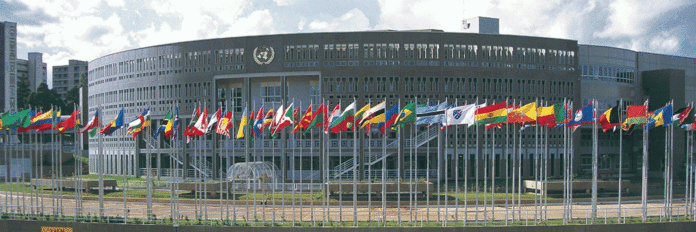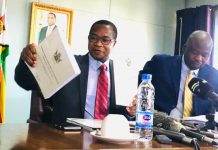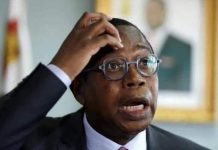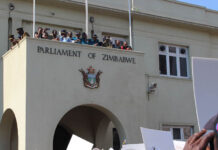
Sydney Kawadza
The COVID-19 pandemic has left more than 30 million Africans unemployed with most government being forced to allocate more than 10 percent of their GDPs to fight the effects of climate change.
In a communique released after the end of the Conference of Ministers of Finance, Planning and Economic Development in Addis Ababa, Ethiopia, it was noted that most African economies were in recession for the first time in a quarter century.
The ministers expressed concern the impact of the coronavirus pandemic on the health of citizens, economies, as well as prospects of achieving the 2030 Agenda for Sustainable Development and Agenda 2063.
“The impact of the pandemic on our economies has been devastating. For the first time in a quarter century, our economies are in recession. Real GDP growth contracted by 2.4 percent in 2020.
“Thirty million people lost their jobs and slipped into poverty. Our revenues plummeted while expenditures soared in response to the pressing needs of the crisis and the exigencies of climate change.
“African countries are now allocating significant proportions of their budgets to implement policies that respond to the impact of extreme weather events, including droughts, floods, crop failures, and infrastructure destruction.”
The ministers said this had undermined the economic outlook of several African countries, triggering credit rating downgrades in at least twelve African countries.
“Six African countries, including Sao Tome and Principe, the only African country set to graduate from LDC status, are now in debt distress.
“For those African countries that have been successful in regaining access to capital markets, the yield spreads on their sovereign bonds are excessive, ranging from 890 to 1,710 basis points for South Africa and Uganda, respectively.
“These premium rates will increase debt burdens and threaten the future debt sustainability of our nascent economies.”
The ministers also expressed their exasperation by the slowness in accessing vaccines and funding for vaccine equity.
“Without rapid access to vaccines, the tidal wave of new coronavirus infections will overwhelm our fragile health systems, decimate limited human resources and set back our recovery,” the ministers said.
Africa had by March 18, 2021, crossed the grim milestone of 4.1 million coronavirus infections, with a case fatality ratio in excess of the global average.
The ministers, however, noted that notwithstanding the difficult fiscal positions, African countries exhibited resilience in their initial response to the pandemic.
“We achieved low infection rates by effective enforcement of social distancing and lockdown measures. We mobilized approximately US$44 billion in domestic resources and, in a highly competitive and contested market, we coordinated our efforts to secure personal protective equipment (PPE) through pooled procurement facilitated by the African Medical Supplies Platform.”
The African Union, in collaboration with Afreximbank, Africa governments secured access to 270 million doses of coronavirus vaccines at competitive prices through the African Vaccines Acquisition Task Team (AVATT).
“These doses are over and above those promised through the COVID-19 Vaccine Global Access (COVAX) facility. However, AVATT and COVAX amounts combined allow us to reach only 42 per cent of Africa’s population.
“An additional $3–4 billion is needed to increase the coronavirus vaccination rate in Africa to 60 percent of the population and achieve herd immunity.”
The ministers expressed their gratitude for the support from the United Nations which financed development initiatives including the financial assistance and support of public development banks, the G20 Debt Service Suspension Initiative (DSSI) and the G20 Common Framework for Debt Treatments beyond the DSSI.
The DSSI has postponed an estimated US$5.1 billion in debt service payments by eligible African countries, providing much needed liquidity to save lives and rebuild livelihoods.
The African Development Bank and the World Bank have committed US$13 billion and US$50 billion, respectively, to support Africa while the IMF has committed US$25.6 billion to Africa through the Rapid Credit Facility, the Rapid Financing Instrument and the Extended Credit Facility.
An additional US$408 million has been approved through the Catastrophe Containment and Relief Trust (CCRT), bringing total commitments to approximately US$26.1 billion.
The European Union has also committed €100 million in humanitarian assistance to support the rollout of vaccination campaigns in Africa, spearheaded by the Africa Centres for Disease Control.
However, the minister, with no end to the pandemic in sight, called for the extension of the duration of the DSSI at least to the end of 2021, and possibly to the end of 2022.
They also called for the expansion of the DSSI scope to address the liquidity needs of middle-income adding that it would be vital to pre-empt the larger threat of insolvency, particularly for countries with market access and relatively strong fundamentals.
The minister expressed concern at the increased importance of private creditors in Africa’s financing landscape, which accounts for 40 percent of the continent’s total debt, compared to a bilateral debt exposure of 27.6 percent.
“Addressing Africa’s debt and future financing needs will be incomplete without taking into account Africa’s exposure to private creditors. But more importantly, the private sector must be a key partner in Africa’s recovery. In this context, blending public and private resources will be vital.
“A swift, bold and positive response on special drawing rights (SDRs) in the range of 500 billion to 650 billion is now needed to arrest the devastating impact of this externally induced crisis on the continent.”
The ministers said investments in sustainable and technology-enhanced agriculture, renewable energy and transport, digitalization, biodiversity, and human capital development are essential for recovering and building forward better.
They also acknowledged recent research by the Economic Commission for Africa and the African Union showing the co-benefits of a job-rich green and resilient recovery.
“Investments in these sectors will create jobs and leverage the African Continental Free Trade Area to build and enhance sustainable regional value chains.
“On our part, Africa is committed to implementing the necessary reforms needed to promote transparency and accountability both in the mobilization and use of domestic and external resources and in the management of debt.
“On revenue mobilization, African countries have demonstrated the benefits of deploying technology to increase revenues. Many countries on the continent have introduced e-taxation to increase resource mobilization.”
Africa countries are deploying digital platforms to engage local communities in the oversight of public spending and transparency, including through information-gathering on public service delivery and the tracking of expenditure commitments.
“We are also strengthening our tax administration systems to identify, track and stem illicit financial flows (IFFs). Global support is needed, however, to continue the battle against IFFs, particularly in the area of big data analytics, machine learning and neural network programming, which provide an array of tools and methods to better predict illicit behaviour and measure IFFs more accurately.”
More African countries are improving the enabling environment for business.
“The comprehensive reforms being undertaken by African countries must be complemented by the availability of more resources for all countries,” the ministers noted.
The ministers noted that with adequate and rapid financing and appropriate comprehensive macro-fiscal and structural policy reforms, African countries can recover from the pandemic much faster and much stronger.
















